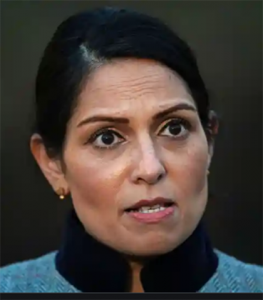UK’s new asylum laws come under fire
The UK is set to introduce draconian new asylum laws that would see asylum seekers sent to camps in Rwanda while their claims are processed and the criminalisation of people entering Britain by boat across the English Channel.
The so called ‘Nationality and Borders Bill’ amends the UK’s Nationality, Immigration and Asylum Act 2002 so that it would be possible to move asylum seekers from the UK while their asylum claim or an appeal is pending.
 Under the new bill, people confirmed to have fled war or persecution would face strengthened checks that could see them blocked from entering the UK based on how they arrived in the country.
Under the new bill, people confirmed to have fled war or persecution would face strengthened checks that could see them blocked from entering the UK based on how they arrived in the country.
“The bill will make it a criminal offence to knowingly arrive in the UK without permission to be here, sending a clear message to migrants thinking about making the dangerous and illegal journey,” the British government says on its website.
“Those who enter the UK illegally will find it harder to stay under fundamental reforms,” it says.
Reports say that UK Home Secretary Priti Patel is in talks with Denmark over sharing a centre in Africa, with the Scandinavian country considering Rwanda as a hub after Danish ministers signed a memorandum on asylum and migration with the central African nation.
The Danish parliament voted on June 3 in favour of a proposal to process asylum seekers outside Europe, potentially the first step in setting up a refugee screening centre in a third country, most likely in Africa.
The reports come as a record 430 migrants crossed the English Channel in small boats on Monday.
The plan has drawn strong criticism from human rights groups, the UN and the European Commission, which said it would undermine international cooperation and lacked guarantees on human rights protection.
UK refugee advocacy group The Refugee Council has said that the bill could have dangerous impacts on those seeking refuge in the UK, however, with the potential to see more than 9,000 refugees who would be accepted under current rules blocked from entering the country.
UK’s Refugee Council chief executive Enver Solomon said that offshore processing was “an act of cruel and brutal hostility towards vulnerable people who through no fault of their own have had to flee war, oppression and terror”.
The UNHCR representative to the UK Rossella Pagliuchi-Lor said reports of a collaboration between Denmark and the UK were “extremely concerning” and urged the UK to “refrain from externalising its asylum obligations”.
“These cannot be outsourced or transferred without effective safeguards in place, both in law and practice,” she said.
“As we have seen in several contexts, externalisation often results in the forced transfers of people to other countries with inadequate protection safeguards and resources, and therefore risks a breach of international refugee and human rights obligations,” Ms Pagliuchi-Lor said.
The UNHCR’s Assistant High Commissioner for protection Gillian Triggs said the UK appeared to be trying to “wash its hands” of its international responsibilities and described the planned asylum overhaul as an “almost neo-colonial approach”.
“What we are finding is that western, developed and wealthy countries are now not sharing responsibilities but shifting burdens to these poor countries,” she said.
Already, hundreds of asylum seekers in the UK have been left in limbo after being told they were being considered for removal to “safe third countries” under the plan.
Over the past year the UK’s Home Office has considered several other outlandish schemes to deal with what it terms ‘the refugee crisis’.
One idea was to buy retired ferries and convert them into floating processing centres.
The ships, moored off the English coast, would hold asylum seekers while they waited for their applications to be dealt with. A similar purported scheme was to process migrants on decommissioned oil platforms in the North Sea,
A leaked document last year showed that the Home Office approached Maritime UK, a trade body, asking for tips on how to build temporary marine fencing in the English Channel. But the idea was not legally possible under terms set out in the International Convention for the Safety of Life at Sea.
At one point, the Home Office was reportedly considering water cannons in the English Channel to create waves that might repel migrant boats before they could land in the UK.
In August 2020, Ms Patel requested support from the Royal Navy to use warships prevent migrants crossing the English Channel and actually appointed an ex-royal marine as a ‘clandestine channel threat commander’. The idea was rejected by senior military figures who described it as a “completely inappropriate and disproportionate approach to take”.












